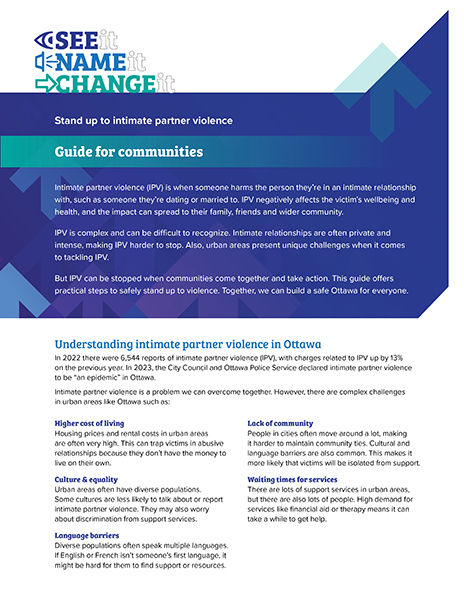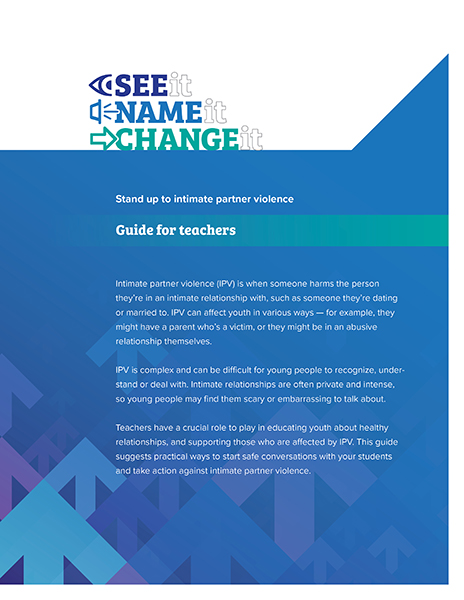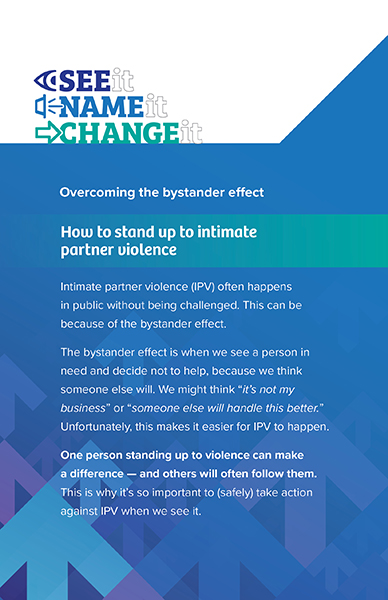See it. Name it. Change it.
Together, we can stop intimate partner violence in Ottawa
See It, Name It, Change It is an educational campaign against intimate partner violence. We help people learn what intimate partner violence is, what it looks like and how to stand up to it. Together, we can build a safer Ottawa for everyone.
Learn what intimate partner violence is and how to spot it.
Call out intimate partner violence when you see it (while staying safe).
Build a safer community through talking, teaching, and challenging violence.
See it: what does intimate partner violence look like?
Intimate partner violence (IPV) is when someone harms the person they’re in an intimate relationship with. Intimate relationships are usually romantic and/or sexual, such as dating or marriage. They can be more private and intense than friendships, making IPV harder to notice and stop. Below are 18 examples of what IPV can look like.
Name it: how do we call out intimate partner violence?
Calling out intimate partner violence is a step towards building a safe community for everyone. It can be difficult to know what to do, so remember the 5 D’s:
Direct: confront the violent person if you feel safe enough
Distract: try and move their attention to something else
Delegate: get help from another person or emergency/support services
Delay: sometimes it’s best to help the victim after the violence
Document: consider taking photos or video as evidence (don’t share it online)
Learn more about the 5 D’s on our stand up to violence page or download our guide.
Change it: ending intimate partner violence in Ottawa
Change won’t happen overnight, but every time you call out violence you’re helping to create a better community for everyone.
Understanding intimate partner violence in Ottawa
It can be harder to tackle intimate partner violence in urban areas like Ottawa because of things like:
Higher cost of living
Housing prices and rental costs in urban areas are often very high. This can trap victims in abusive relationships because they don’t have the money to live on their own.
Culture & equality
Urban areas often have diverse populations. Some cultures are less likely to talk about or report intimate partner violence. They may also worry about discrimination from support services.
Language barriers
Diverse populations often speak multiple languages. If English or French isn’t someone’s first language, it might be hard for them to find support or resources.
Lack of community
People in cities often move around a lot, making it harder to maintain community ties. Cultural and language barriers are also common. This makes it more likely that victims will be isolated from support.
Waiting times for services
There are lots of support services in urban areas, but there are also lots of people. High demand for services like financial aid or therapy means it can take a while to get help.
About the SINICI Ottawa Campaign
The See It, Name It, Change It (SINICI) Ottawa campaign was launched in response to the increasing intimate partner violence in Ottawa. It was inspired by a rural-focused project by Lanark Interval House. The campaign is led by Ottawa Victim Services, a not-for-profit organization supporting the local community since 1998.
SINICI provides information and guidance on safely standing up to intimate partner violence. We also educate people about intimate partner violence in Ottawa specifically, with the aim of creating a safer community for all.



